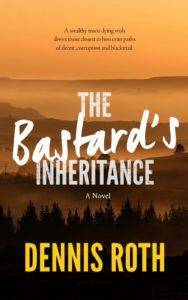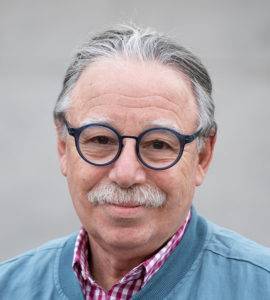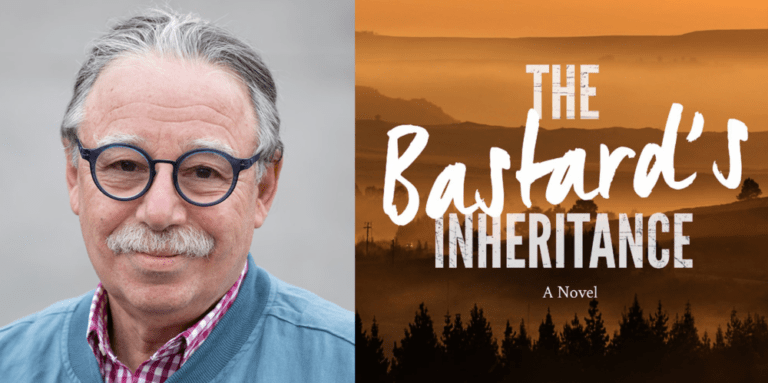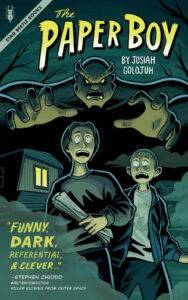“Henry Molnar and Murray Applebaum shared a secret so strong and powerful that neither ever dared to consider revealing the truth it contained.” – The Bastard’s Inheritance
From the Publisher: “In the 1970s, in western Pennsylvania, a multi-millionaire’s singularly selfish decision destines his two sons, half-brothers, to wage war in a winner-take-all battle for the family legacy…”
About the Author: “Dennis Roth is always stretching his boundaries and does the same for his friends, readers and fictional characters. This has led to a remarkable life. When he becomes an expert in a field, he moves directly off to another. After earning an engineering degree from MIT, he founded what has become one of the largest structural engineering firms on the east coast of the US.
He retired young and lived with his wife on-board their 35-foot sailboat, Second Wind, in the Caribbean. After enjoying a thousand of magnificent sunsets and then burying the anchor, he moved to watercolor painting. His innate skills blossomed into beautiful, nationally shown and awarded landscapes and seascapes. These he exhibited and sold in his art gallery, Studio Phase 3.
Since 2012 he has dedicated his creative energies to writing poems and stories which in addition to being published in journals and magazines, have been collected in his two chapbooks, ‘Reflections & Other Musings‘ and ‘Harry & Other Stories.’ And now he has created ‘The Bastard’s Trilogy’ anchored by the new novel The Bastard’s Inheritance…”
 Your book is set primarily in Western Pennsylvania in the 1970s. Why did you choose this time period and location?
Your book is set primarily in Western Pennsylvania in the 1970s. Why did you choose this time period and location?
I frequently write about the mid-twentieth century, a coming-of-age time for me, but more importantly, because even by the late ‘70s computers/iPhones/the internet had not so completely invaded our lives and society. It’s the end of the age when life moved more slowly with less complexity. The electronic age grew so quickly, that it can be difficult to have the appropriate devices available for a particular date. That problem is resolved by starting and ending before the ‘80s. I grew up about 30 miles from the town upon which fictitious Parkerton, PA was modeled. I knew the area very well. That familiarity gave me the material to realistically describe places, events and weather.
 When you began writing The Bastard’s Inheritance, was your focus on the characters or the plot?
When you began writing The Bastard’s Inheritance, was your focus on the characters or the plot?
I like to read and write character driven stories. I start with a general idea of a couple of characters, put them in a simple setting, and let them talk. As they get to know each other, I get to know them. I begin to see how their lives have evolved and where they might be going. In The Bastard’s Inheritance, I wanted some obvious built-in conflict and what better source than two siblings. That morphed into two brothers, then two half-brothers, then one was illegitimate and from another country. Their conversations, their ways of thinking and what they think about guided me. I found out early on that their father was very wealthy, that the mother of the illegitimate son had a genetic disease that killed her while he was very young. And so on. The story developed out of the needs and wants of the character as they revealed themselves to me.
Tell us something funny about one of your characters.
I’d been working on The Bastard’s Inheritance for about 2 years and knew the characters very well. One of them, Murray Applebaum, is an attorney with some personal legal and ethical dilemmas. One evening my wife and I were at a cocktail party where we were chatting with two or three other couples. One of them started to tell her story of an attorney friend of hers who had troubles with the law and his profession. I started to say, “I have a friend like that,” when I realized it wasn’t a friend I was thinking of. It was my character, Murray.
Were you surprised by the behavior of any of your characters or the direction of your plot at any point while writing?
This answer is about Murray, too. To escape his troubles, he heads off in his sailboat. He encounters terrible storms, the death of a crewmate overboard, problems with Haitian privateers and more. But after all, it didn’t fit in the book and half a dozen chapters had to be cut.
If you could give advice to new authors, what would you say?
Read, read and then read. In between, write and write. Avoid television and your iPhone. They are vicious time sinks. Try not to self-edit until your first draft is complete. Self-editing is a time sink, too. Get your ideas on paper and then, as Stephen King has said, edit your shitty first draft. Finally, no matter what, don’t give up.

























